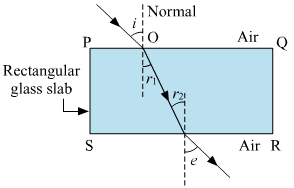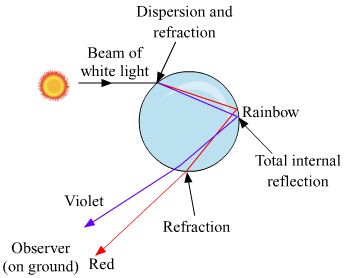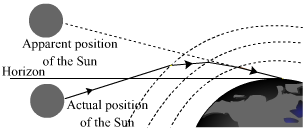Class 10 science part 1 chapter 6 refraction of light textbook solutions
Refraction of Light Class 10 Solutions Pdf :
Solving all the questions of Refraction of light chapter from the textbook without any trouble is a difficult task for class 10 students. Most of the time Students get stuck with a particular Complex question. They try to attempt solving questions several times but are unable to find the correct answer. For these Our Class 10 Science textbooks Solutions have been studied & analyzed by ybsrudys experts and the solutions have been created as per the Maharashtra state board syllabus and students understanding. Students can easily access these useful Solution of 10th Class Science Refraction of light Class 10 Notes Pdf Download. Here We are providing class 10 science part 1 chapter 6 refraction of ligh step-by-step solutions for that help you understand and learn how to solve answer properly.
Important points to Remember :
- Light changes its direction when going from one transparent medium to another transparent medium. This is called the refraction of light.
- The refractive index of a medium with respect to vacuum is called its absolute refractive index.
- Refractive index depends on the velocity of light in the medium.
- The process of separation of light into its component colours while passing through a medium is called the dispersion of light.
- Sir Issac Newton was the first person to use a glass prism to obtain Sun’s spectrum.
Refraction of Light Class 10 Question and Answers Maharashtra board :
Question 1: Fill in the blanks and Explain the completed sentences.a. Refractive index depends on the wavelength of light.
b. The change in direction of light rays while going from one medium to another is called refraction.
Question 2: Prove the following statements.
sin isin r1=μ
sin is in r1=μ …..(i)
and
sin r2sin e=1μ
sin r2 sin e=1μ …..(ii)
But, r1 = r2 …..(iii)
Putting (iii) in (i), we have
sin isin r2=μ
sin is in r2=μ …..(iv)
Multiplying (i) and (iv), we have
sin isin e=1ori=e
sin is in e=1 ori=e
b. A raibow is the combined effect of the refraction, dispersion, and total internal reflection of light.
Answer :
- After rainfall, the tiny droplets of water present in the atmosphere act as a prism for the rays coming from the Sun.
- Thus, the sunlight after striking the surface of the droplets gets refracted and dispersed into its seven components as shown in the figure (figure showing just two components).
- After this, the light rays are subjected to total internal reflection. Then the rays are again refracted when they come out of the water droplet. Hence, rainbow formation is the combined effect of the refraction, dispersion, and total internal reflection of light.
Question 3: Mark the correct answer in the following questions.
A. What is the reason for the twinkling of stars?
i . Explosions occurring in stars from time to time
ii. Absorption of light in the earth’s atmosphere
iii. Motion of stars
iv. Changing refractive index of the atmospheric gases
Answer : Stars twinkle because their light must pass through pockets of Earth’s atmosphere. Atmospheric air has changing refractive index at various altitude.
Starlight continuously travel from rarer medium to denser medium. Hence it continuously bends towards the normal.
Refractive index of air medium gradually increase with a decrease in altitude.
The continuous bending of starlight towards the normal results in a slight rise of the apparent positions of the star.
B. We can see the Sun even when it is little below the horizon because of
i. Reflection of light
ii. Refraction of light
iii. Dispersion of light
iv. Absorption of light
Answer :
- We can see the Sun even when it is little below the horizon because of refraction of light.
- Refraction is the bending of light as it passes from one transparent substance into another.
- When we see the sun, the light is actually refracted from atmosphere due to change in air density.
- Therefore, even when the sun is little below horizon, it can be seen in sky.
C. If the refractive index of glass with respect to air is 3/2, what is the refractive index of air with respect to glass?
a. 1/2
b. 3
c. 1/3
d. 2/3
Answer : D
Tags : Refraction of light Class 11 maharashtra Board, Refraction of light Notes Class 10 Class 10 Science chapter 1 Gravitation, Light Reflection and Refraction Class 10 questions and Answers in Hindi 10 Class Science Part 1 Gravitation Assignment of Chapter light Class 10, 10th Science Part 1hapter 2 exercise, Science part 1 std 10.



